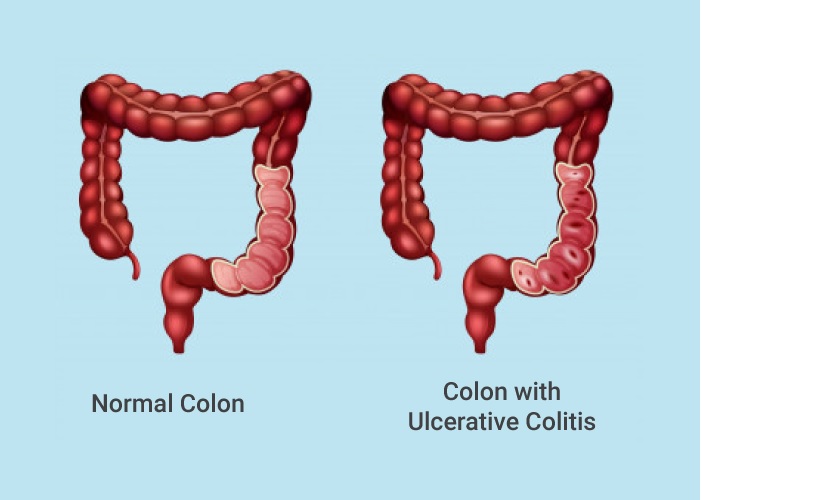Introduction to United Kingdom Ulcerative Colitis Industry
Ulcerative colitis is a type of inflammatory bowel disease that causes long-lasting inflammation and ulcers in the lining of the large intestine. The large intestine, which is also called the large bowel or colon, is the last part of the digestive tract. Ulcerative colitis commonly involves bloody diarrhea and abdominal discomfort. Ulcerative colitis only affects the colon and the rectum. It does not affect the small intestine
Causes and Risk Factors of United Kingdom Ulcerative Colitis Industry
The exact cause of Ulcerative Colitis is unknown, but it is believed to be an abnormal immune system response in genetically susceptible individuals. Some potential risk factors include family history of IBD, smoking, oral contraceptives, and appendectomy. Researchers have identified certain genes that may increase the risk of developing ulcerative colitis. Having a close relative with ulcerative colitis or Crohn’s disease increases the risk. Smoking cigarettes is also linked to worse symptoms and a higher relapse rate in those with ulcerative colitis.
Symptoms of Ulcerative Colitis
The most common symptoms of ulcerative colitis include:
– Bloody diarrhea- Often the earliest and most prominent sign of active disease. Stool may contain blood, pus, and mucus.
– Abdominal pain and cramps- Severe, persistent cramping pain in the lower abdomen.
– Rectal bleeding- Passing blood from the rectum without having a bowel movement.
– Urgent need to have a bowel movement- Getting the urgent urge to pass stool frequently.
– Fatigue- An overall feeling of being extremely tired.
– Fever- Associated with more severe disease that involves the entire colon.
– Loss of appetite and unintended weight loss.
– Joint pain- In the knees, heels, wrists, or elbows. Usually comes and goes.
Diagnosis of Ulcerative Colitis
Your GP or IBD specialist will examine you and ask you about your symptoms to determine if you may have ulcerative colitis. Tests that may be performed include stool sample tests, blood tests, sigmoidoscopy or colonoscopy, and imaging tests like CT scans. A sigmoidoscopy allows doctors to visualize the lower colon/rectum using a flexible tube inserted through the anus. Colonoscopy allows visualization of the entire colon using a colonoscope inserted through the anus. Biopsies may be taken during these procedures to confirm the diagnosis under a microscope.
Treatment and Management of Ulcerative Colitis
There is no cure for ulcerative colitis, but treatment aims to induce and maintain remission of symptoms. Mild to moderate flares are usually treated with oral medications such as mesalamine, sulfasalazine, prednisone, and biologics. Severe flares may require hospitalization and intravenous steroids, fluids, electrolytes, and nutrition. Surgery to remove the colon (proctocolectomy) is considered for severe cases that do not respond to medical management and increase the risk of colon cancer. Most patients can achieve long periods of remission with medication adherence, proper diet, exercise, and stress management strategies.
Living with Ulcerative Colitis in the UK
Most UK hospitals have IBD specialist nurses available to help patients learn to manage their condition and maintain remission. Several organizations support people suffering from ulcerative colitis, including Crohn’s and Colitis UK and the National Association for Colitis and Crohn’s Disease (NACC). These groups offer information, support communities, counselling services, advocacy, and fundraising to help improve patient care. Access to appropriate medication and multidisciplinary care is available through the NHS. Patient advocacy groups lobby for continued improvements in disease management strategies and increased research funding. Overall, with effective treatment and lifestyle modifications, most people are able to live fulfilling lives despite having ulcerative colitis.
Increased Risk of Colon Cancer
Patients with long-standing ulcerative colitis lasting for 8-10 years are at an increased risk of colon cancer. Regular surveillance colonoscopy is recommended after 8-10 years of having ulcerative colitis to screen for dysplasia, which is a pre-cancerous condition. Any dysplasia found on colonoscopy may prompt closer surveillance or even surgical removal of the colon depending on its severity and complexity. Maintaining disease remission as much as possible through medication adherence helps lower the cancer risk. Some research suggests anti-inflammatory drugs like mesalamine may help reduce cancer risk for those with ulcerative colitis.
Living with Symptom Flares
Despite treatment, many people still experience periods when their symptoms flare up, or get worse. Stress, diet, infection, and missing medications can all potentially trigger flares. When this happens, it is important to see your IBD doctor or specialist nurse to help get symptoms under control through adjustment of medications or additional therapies as needed. Following a bland diet with small, frequent meals can help reduce abdominal discomfort during a flare. Getting plenty of rest is also important. Your employer is required by law to make reasonable adjustments for periods of illness related to ulcerative colitis. Speaking to your IBD team and patient groups can help you learn strategies for dealing with flares and their impact on your daily life.
Overall, With advances in medical treatments, early diagnosis, and better management strategies, the overall outlook for people living with ulcerative colitis in the UK is good. Most will achieve long periods of remission through optimized therapy and lifestyle modifications. The risk of colon cancer is significantly reduced through regular colonoscopic surveillance. Specialist IBD care through the NHS and support from patient organizations help UK patients obtain the healthcare and coping strategies they need to actively take part in day-to-day life despite having this chronic condition. Continued awareness, research and care improvements aim to further enhance quality of life for all those affected by ulcerative colitis in Britain.
*Note:
1.Source: CoherentMI, Public sources, Desk research
2.We have leveraged AI tools to mine information and compile it



